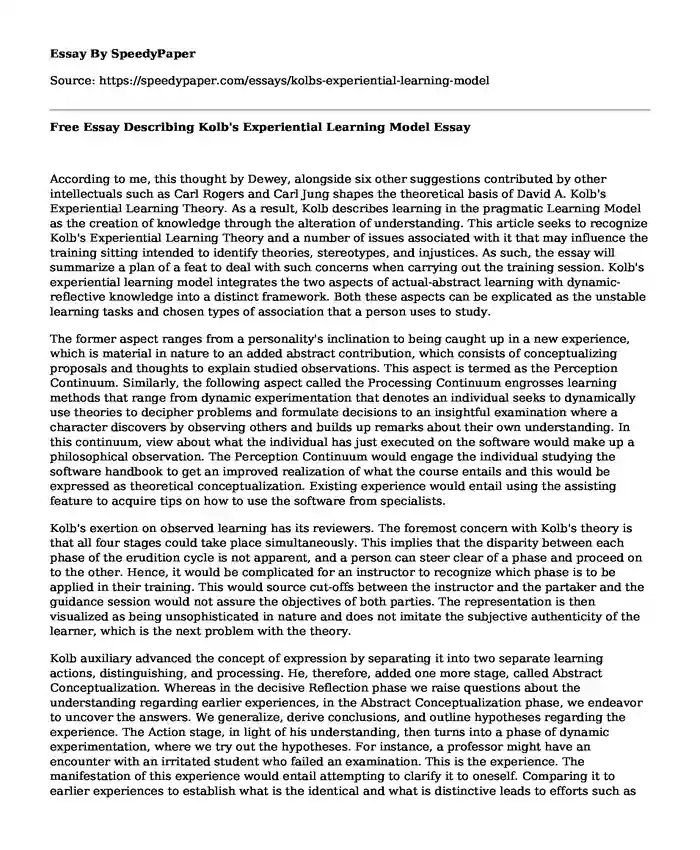According to me, this thought by Dewey, alongside six other suggestions contributed by other intellectuals such as Carl Rogers and Carl Jung shapes the theoretical basis of David A. Kolb's Experiential Learning Theory. As a result, Kolb describes learning in the pragmatic Learning Model as the creation of knowledge through the alteration of understanding. This article seeks to recognize Kolb's Experiential Learning Theory and a number of issues associated with it that may influence the training sitting intended to identify theories, stereotypes, and injustices. As such, the essay will summarize a plan of a feat to deal with such concerns when carrying out the training session. Kolb's experiential learning model integrates the two aspects of actual-abstract learning with dynamic-reflective knowledge into a distinct framework. Both these aspects can be explicated as the unstable learning tasks and chosen types of association that a person uses to study.
The former aspect ranges from a personality's inclination to being caught up in a new experience, which is material in nature to an added abstract contribution, which consists of conceptualizing proposals and thoughts to explain studied observations. This aspect is termed as the Perception Continuum. Similarly, the following aspect called the Processing Continuum engrosses learning methods that range from dynamic experimentation that denotes an individual seeks to dynamically use theories to decipher problems and formulate decisions to an insightful examination where a character discovers by observing others and builds up remarks about their own understanding. In this continuum, view about what the individual has just executed on the software would make up a philosophical observation. The Perception Continuum would engage the individual studying the software handbook to get an improved realization of what the course entails and this would be expressed as theoretical conceptualization. Existing experience would entail using the assisting feature to acquire tips on how to use the software from specialists.
Kolb's exertion on observed learning has its reviewers. The foremost concern with Kolb's theory is that all four stages could take place simultaneously. This implies that the disparity between each phase of the erudition cycle is not apparent, and a person can steer clear of a phase and proceed on to the other. Hence, it would be complicated for an instructor to recognize which phase is to be applied in their training. This would source cut-offs between the instructor and the partaker and the guidance session would not assure the objectives of both parties. The representation is then visualized as being unsophisticated in nature and does not imitate the subjective authenticity of the learner, which is the next problem with the theory.
Kolb auxiliary advanced the concept of expression by separating it into two separate learning actions, distinguishing, and processing. He, therefore, added one more stage, called Abstract Conceptualization. Whereas in the decisive Reflection phase we raise questions about the understanding regarding earlier experiences, in the Abstract Conceptualization phase, we endeavor to uncover the answers. We generalize, derive conclusions, and outline hypotheses regarding the experience. The Action stage, in light of his understanding, then turns into a phase of dynamic experimentation, where we try out the hypotheses. For instance, a professor might have an encounter with an irritated student who failed an examination. This is the experience. The manifestation of this experience would entail attempting to clarify it to oneself. Comparing it to earlier experiences to establish what is the identical and what is distinctive leads to efforts such as scrutinizing it according to the individual or institutional principles, and creating a plan of action linked to the occurrences of others, such as chatting to other lecturers who have also encountered angry learners. Talking to other instructors through this action will then lead to added reflection.
Understanding an individual's preferred learning approach has two advantages. It assists us to value our areas of fault, giving us the chance to toil on becoming extra proficient in the other approaches. It also assists us to appreciate our strengths, which may be valuable in definite social circumstances, such as choosing a profession. In my opinion, the main advantage of exploitation of the account lies not in its result on students, but rather, in its result on educators. In spite of what outcomes the inventory might generate, its mere existence highlights understanding as a vital element of learning. Even nowadays, most tutoring is still critical, an approach that disregards an apprentice's experience. In addition, as Brookfield mentions, educators tend to be so worried about presenting information such that they fail to notice student needs and to reflect upon them.
Not every writer agrees with Kolb's theory. As for the record, Kolb, himself, calls attention to its greatest drawback. The outcomes are based exclusively on the manner learners rate themselves. Nevertheless, Kolb's inputs cannot be taken too lightly. Whatever their drawbacks, by presenting a representation of experience in a systematic form, he has facilitated the move of enlightening thoughts from the locus of the trainer back to the learner. As many of the major contributors to the field have mentioned, experience has yet again turned into a viable subject of dialogue.
Cite this page
Free Essay Describing Kolb's Experiential Learning Model. (2021, Mar 15). Retrieved from https://speedypaper.net/essays/kolbs-experiential-learning-model
Request Removal
If you are the original author of this essay and no longer wish to have it published on the SpeedyPaper website, please click below to request its removal:
- Free Essay: Female Sex Offender Risk Assessment
- Izzie's Case Reflection Paper Example
- Free Essay on Family System Theory and Family Interventions
- Free Essay on Women Changing the World
- Wisconsin Card Sorting Test, Case Study Example
- Personal Essay Example: Career Action Plan
- Namibian Political Science, Free Essay Sample
Popular categories





